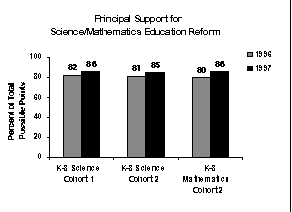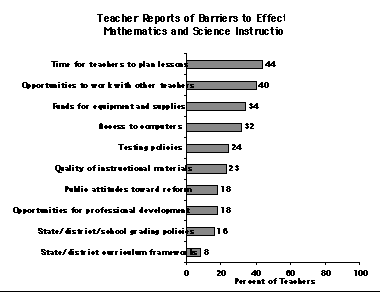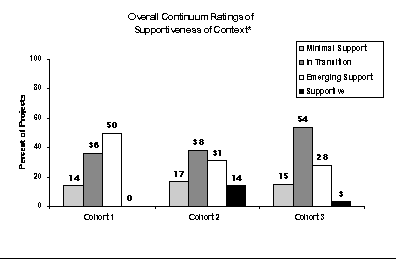page 11 of 13
Chapter Eight
Supportiveness of Context
Systemic reform theory underlying the LSC initiative calls for aligning policies and practices in
support of standards- based mathematics and science education. LSC project evaluators were
asked to assess the supportiveness of the policy environment in a number of areas including the
curriculum scope and sequence, student assessment, and teacher evaluation policies. This
chapter summarizes (1) the current landscape across LSC projects with respect to issues of
supportiveness of standards- based reform; and (2) evaluators' assessments of the impact that
LSC projects are having on this policy landscape.
As in the case of the quality of LSC professional development activities, evaluators were asked
to rate districts on a five- point continuum for supportiveness of context. In order to standardize
the inputs to these continuum ratings, evaluators were asked to:
- Review relevant data collected through teacher and principal questionnaires, teacher
interviews, District Information Forms, classroom observations, and interviews with
the project PI;
- Rate districts by (a) the extent to which specific policies and practices (e. g. curriculum
scope and sequence) hinder or facilitate mathematics and science reform processes in
the district, (b) the extent of support exhibited by stakeholders within the K- 12
education system as well as those who are external to the system (e. g. parents), and (c)
the extent to which specific structures for maintaining a supportive district context are
in place (e. g., mechanisms for monitoring the alignment of policies and practices with
the LSC vision for mathematics/ science education);
- Summarize all of the data into a single rating of the supportiveness of the district
context, ranging from Level 1, where existing policies and practices hinder effective
mathematics/ science education and there is considerable active opposition to reform
among stakeholders, to Level 5, where most key policies and practices are aligned to
support exemplary mathematics/ science education and stakeholders are actively
supportive of reform efforts;1 and
- Consider how the LSC has influenced support for standards- based mathematics and
science education in the participating districts.
Strategies to Increase Stakeholder Support
Evaluators were asked to identify some of the mechanisms used by the LSC projects to engender
support among key stakeholders. The most common strategy reported by the evaluators was the
involvement and active participation of principals (and, to a lesser degree, central office staff) in
professional development activities. For the most part, these kinds of professional development
activities were designed specifically for administrators, but projects also included principals in
teacher professional development activities as a way to increase both their support and their
capacity for instructional leadership in mathematics and science.
In [the LSC], principals were included through a series of six half- day
[administrator academies]. Through these workshops, principals were
introduced to project goals and the pedagogical strategies underpinning the
proposed program of mathematics education reform.
* * *
One major focus of effort has been on principals and central office
administrators. They have been included and encouraged to participate in all
[LSC leadership] training sessions and meetings. In addition, training sessions
have also been designed specifically for them as in the case of [a classroom
observation workshop] conducted this past spring and designed so that principals
and central office administrators have a shared sense of what constitutes highquality science education.
LSC evaluators reported a variety of strategies used by projects to increase the support of
community stakeholders, as well. A number of projects reached out to parents by hosting Family
Math and Science nights or inviting parents to attend teacher professional development activities;
another project hired parent volunteers to refurbish science kits. Other projects focused attention
on science- rich organizations, for example, using business volunteers to cover classes while
teachers attended professional development programs, or collaborating with local science
museums on grant writing activities. Only one evaluator reported a project undertaking a
publicity campaign as a means of gaining broad- based community support. Overall, evaluators
report that about half of the districts have devoted considerable attention to developing
mechanisms which maintain support within the educational community; fewer (about one- third)
of the LSC districts have focused efforts on maintaining the support of the broader community.
At this point in the projects, the most active support for LSC reforms appears to come from
teachers involved in the LSC activities, administrators, and institutions. Parents, non- LSC
teachers, and teacher unions were most likely to be deemed "neutral," neither actively supporting
nor opposing reform.
Evidence of the Impact of the LSC on Stakeholder Support
When asked to reflect on the impact of LSC activities on stakeholder support for reform,
evaluators most frequently identified increased collegiality among LSC participants. As one
evaluator put it, the "sheer number of hours teachers spend in professional development in
mathematics and science sets the stage for the development of collegial relationships."
Other evaluators noted that the various ways projects had involved principals and other
administrators had led to a better understanding of the support teachers need and a greater
willingness to provide them with the necessary resources.
Questionnaire data from both teachers and principals support the evaluators' anecdotal evidence.
Both groups were asked about principal support for standards- based mathematics and science
education, including for example, the extent to which the principal accepts the noise that comes
with an active classroom.
Figure 36 shows the mean of total percentage points possible on the composite created by
summarizing principal responses to the 4 items in this area. For each group-- Cohort 1 science,
Cohort 2 science, and Cohort 2 mathematics-- there was a small but significant increase in
principal support for reform between 1996 and 1997. Teacher results for a related composite
were similar, with generally higher means for perceived principal support in 1997 than in 1996.

Figure 36
Status of District Policies and Practices
Teachers, principals, and evaluators were all asked to rate the extent to which specific policies
and practices hinder or facilitate mathematics and science reform processes. Areas most
frequently reported to facilitate reform included quality of instructional materials, curriculum
scope and sequence, systems for purchasing and managing materials and supplies, and the
importance placed on mathematics and science education. In contrast, policies for teacher
recruitment, teacher evaluation, and student assessment were judged to be impeding reform in
quite a few districts.
Inadequate time for teachers to plan, both individually and with their colleagues, appears to be
particularly problematic. While the precise percentages differ among teachers of the various
subjects, and between teachers and principals, all groups agreed that the factors that most impede
effective instruction are:
- Time available for teachers to plan and prepare lessons;
- Opportunities for teachers to work with other teachers; and
- Funds for purchasing equipment and supplies.
For example, as can be seen in Figure 37, 44 percent of targeted teachers indicated that the lack
of time available for teachers to plan and prepare lessons inhibited effective instruction, roughly
twice as many as cited such factors as inadequate opportunities for professional development,
quality of instructional materials, state or district testing policies, or public attitudes toward
reform.

Figure 37
There is evidence, however, that the LSC projects are making headway, albeit slowly, in dealing
with the issues of teacher time. Trend data from Cohorts 1 and 2 show a small increase in the
percent of teachers indicating that they have time during the regular work week to work with
their colleagues, from 13 percent in 1996 to 16 percent in 1997.
Overall Ratings of Supportiveness
Evaluators were asked to use all of the information available to them to rate the extent to which
the district contexts support the LSC reform. Figure 38 provides a summary of the district
continuum ratings by cohort for 82 districts across the 46 LSC projects. Note that there appears
to be a trend toward a supportive context from projects in their earliest stages (Cohort 3) to the
most veteran of the LSCs (Cohort 1). The modal rating for Cohort 1 districts is 4, which
indicates "emerging support" in terms of policy alignment and commitment of diverse
stakeholders. By the same measure, Cohort 3 districts are predominantly "in transition,"
modifying policies that hinder effective mathematics/ science education and grappling with
uneven support among stakeholders. The distribution of ratings for districts in Cohort 2 projects
shows them to be shifting from "in transition" to "emerging support."

Figure 38
* None of the district contexts were rated "non- supportive."
Summary
- Evaluators report a variety of strategies used by the LSC projects to involve key
stakeholders, most notably principals, but also central office staff, parents and other
community members. Based on questionnaire data from both teachers and principals, there
has in fact been an increase in principal support for mathematics and science education
reform. In addition, many of the LSC projects have garnered the active support of
institutions for higher education, business/ industry, museums, and other science- rich
institutions. In contrast, evaluators typically reported that parents, non- LSC teachers, and
teacher unions were not actively involved in supporting the LSC reforms.
- Based on evaluator reports, relatively few LSC projects have developed specific strategies to
influence district policies. The problem may be that project staff, who have expertise in
professional development, may not be skilled in strategic planning and systemic reform. Or
perhaps evaluators are less attuned to the nuances of policy alignment and therefore less
likely to focus on this area in their reports.
Footnote
1 In projects involving multiple districts, evaluators were asked to provide separate ratings for a sample of three districts that were broadly
representative of the participating districts.

